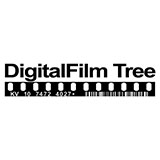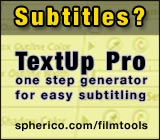|
|
Film Editing - What to Study?
Posted by Greaser
|
Film Editing - What to Study? November 06, 2010 01:53PM |
Registered: 16 years ago Posts: 57 |
At this point in my life I can't afford the time or cash to go back to school. Hopefully things will change in the next few years. I do have a BA in photo and hopefully I can apply that somewhere here. What I can do at this time is keep pushing my experience with FCP, Motion, etc. I have plenty of Lynda and other tut's as far as mechanics, so I'm good there. This along with reading whatever I can get my hands on will have to do at this time. I'm taking on some freebies to begin working with clients, which I hope will push me to begin conveying what they're envisioning. I'm not exactly sure where I'd like an editing career to go as far as a specialty, yet I am sure that after a while of getting my feet wet I'll begin to see my path. If not, I'm open to no specific specialty as long as I survive and enjoying it.
At one point I thought, Trailers. If that is where I want to go what should I be studying about the art of editing them? I watch plenty of them and think that I understand what makes a successful trailer, but I wanted some input here.
I'm still reading Walter Murch's book, but at night, just like anyone else, I like to kick back and watch something entertaining, hopefully a good film, which is hard to find these days. What films would be a good study and why? What would be a short list to look for from an editing point of view?
Although I've seen most of the films mentioned in Murch's book, would those be the best for me to study or would it slant me in the direction of only one editor too much, if that makes sence?
What other books are recommended reading?
Lastly, is there a site online that would fill all my questions above? In-other-words where's a good place/site to go study?
Thanks for any help.
Tony
At one point I thought, Trailers. If that is where I want to go what should I be studying about the art of editing them? I watch plenty of them and think that I understand what makes a successful trailer, but I wanted some input here.
I'm still reading Walter Murch's book, but at night, just like anyone else, I like to kick back and watch something entertaining, hopefully a good film, which is hard to find these days. What films would be a good study and why? What would be a short list to look for from an editing point of view?
Although I've seen most of the films mentioned in Murch's book, would those be the best for me to study or would it slant me in the direction of only one editor too much, if that makes sence?
What other books are recommended reading?
Lastly, is there a site online that would fill all my questions above? In-other-words where's a good place/site to go study?
Thanks for any help.
Tony
|
Re: Film Editing - What to Study? November 06, 2010 02:22PM |
Moderator Registered: 17 years ago Posts: 10,771 |
The Walter Murch book is one of my bibles, but I really don't think it applies very much to trailers. Promos and especially trailers speak their own language. I learned a lot more about them by working with an experienced trailer producer, when I was cutting my first trailer. It's as much writing as it is editing, and the trailer's script may only bear a slight semblance to the original film.
I don't think books will get you very far. I think what you should do is edit as many spec trailers as you can. Basically, find existing feature films and cut trailers for them. Do a number of them, in different genres -- an action-film trailer is different from a comedy trailer. They can then be used unofficially as part of your talent reel. I know one working editor who did a spec trailer for Glengarry Glen Ross which became one of his calling cards for getting his first paying jobs.

www.derekmok.com
I don't think books will get you very far. I think what you should do is edit as many spec trailers as you can. Basically, find existing feature films and cut trailers for them. Do a number of them, in different genres -- an action-film trailer is different from a comedy trailer. They can then be used unofficially as part of your talent reel. I know one working editor who did a spec trailer for Glengarry Glen Ross which became one of his calling cards for getting his first paying jobs.

www.derekmok.com
|
Re: Film Editing - What to Study? November 06, 2010 03:15PM |
Registered: 16 years ago Posts: 57 |
|
Re: Film Editing - What to Study? November 06, 2010 03:36PM |
Moderator Registered: 17 years ago Posts: 10,771 |
> Since I'm currently unemployed, would approaching a "trailer producer" and say I'll work for free, just
> to gain experience seem crazy.
Do you have a general editing reel? If you don't yet, you're going to have to do some work for free just to build contacts, experience and a reel.

www.derekmok.com
> to gain experience seem crazy.
Do you have a general editing reel? If you don't yet, you're going to have to do some work for free just to build contacts, experience and a reel.

www.derekmok.com
|
Re: Film Editing - What to Study? November 07, 2010 03:57PM |
Registered: 17 years ago Posts: 6,730 |
Books are garbage (aesthetic editing books, that is) for getting work. They help with decision making when you're making 6 figures freelancing, but nobody ever hired me because I read a book. Get your hands on and start a reel any way you can. Show up on time, finish on time, don't bump into the furniture. Ask a lot of questions, be enthusiastic, do whatever it takes to finish on time and on budget.
Pro Bono (free) is the way to start...do Student films / local cable / local businesses / etc (VOLUNTEER to make spots for ANYBODY in your community). I started by making a music video for free for a local band when I was a Bartender. They were broke. I was broke. Now the guitar player plays for Porcupine Tree and he never forgot about my video and what I gave them for free.
FWIW...I think it's funny how people think that trailer editing is a sub-form or a "beginning" form of editing. That's a total misconception. Trailer creation is an art. You can create or kill interest in a piece with the trailer.
When life gives you dilemmas...make dilemmanade.

Pro Bono (free) is the way to start...do Student films / local cable / local businesses / etc (VOLUNTEER to make spots for ANYBODY in your community). I started by making a music video for free for a local band when I was a Bartender. They were broke. I was broke. Now the guitar player plays for Porcupine Tree and he never forgot about my video and what I gave them for free.
FWIW...I think it's funny how people think that trailer editing is a sub-form or a "beginning" form of editing. That's a total misconception. Trailer creation is an art. You can create or kill interest in a piece with the trailer.
When life gives you dilemmas...make dilemmanade.

|
Re: Film Editing - What to Study? November 11, 2010 01:30PM |
Registered: 16 years ago Posts: 8,836 |
I can't believe I haven't replied this one yet. Someone once told me years ago to "be obsessive". I suppose that is the only way to really learn something well. The best place to learn about editing is to watch it. Watch lots of everything, sketch out the storyboard of scenes you like in a film to see how they were cut. Break a film you like down to its acts, and do character sketches, find the motivation of each character within a scene to see how the story was told.
Derek once mentioned to watch a lot of standard "genre" films as opposed to art films, partly because you do not want to be locked into the typical film school mentality of "anything goes". I both agree and disagree, because most of my favourite films are art films- The Godfather, JFK, Raging Bull, Cinema Paradiso, the Silence of the Lambs. Those are pure editing classics. That said, I also loved the editing in Inception, Heat, The Bourne Ultimatum, Oceans 11 (watch out for the long L cuts), Boston Legal, etc... Not sure if these are considered standard "genre" films.
>Trailer creation is an art. You can create or kill interest in a piece with the trailer.
I agree on this too. It is a slightly different discipline, and although editing is about storytelling, the difference can be hard to put down in words. On one hand, a trailer editor works to create a story to sell the story, while a long form editor works to tell the story.
Also, in some cases, trailer editors tend to be quite proficient with mograph, as a lot of short form work these days tend to have a fair share of motion graphics. This is less common with long form narratives, because editors tend to spend weeks and months on a single edit so graphics and effects are usually done by someone else.
I hope you managed to make some sense of my incoherent uttering.

www.strypesinpost.com
Derek once mentioned to watch a lot of standard "genre" films as opposed to art films, partly because you do not want to be locked into the typical film school mentality of "anything goes". I both agree and disagree, because most of my favourite films are art films- The Godfather, JFK, Raging Bull, Cinema Paradiso, the Silence of the Lambs. Those are pure editing classics. That said, I also loved the editing in Inception, Heat, The Bourne Ultimatum, Oceans 11 (watch out for the long L cuts), Boston Legal, etc... Not sure if these are considered standard "genre" films.
>Trailer creation is an art. You can create or kill interest in a piece with the trailer.
I agree on this too. It is a slightly different discipline, and although editing is about storytelling, the difference can be hard to put down in words. On one hand, a trailer editor works to create a story to sell the story, while a long form editor works to tell the story.
Also, in some cases, trailer editors tend to be quite proficient with mograph, as a lot of short form work these days tend to have a fair share of motion graphics. This is less common with long form narratives, because editors tend to spend weeks and months on a single edit so graphics and effects are usually done by someone else.
I hope you managed to make some sense of my incoherent uttering.

www.strypesinpost.com
|
Re: Film Editing - What to Study? November 11, 2010 01:50PM |
Moderator Registered: 17 years ago Posts: 10,771 |
> Derek once mentioned to watch a lot of standard "genre" films as opposed to art films, partly because
> you do not want to be locked into the typical film school mentality of "anything goes".
For a healthy balance, you don't want to neglect either art-house or commercial films. I might put it this way: Studying commercial film editing teaches you how to engage an audience on its terms; studying art film editing teaches you how to engage an audience on your own terms.
The former teaches you how to be solid, practical, accessible and hireable; the latter teaches you how to be risky, idiosyncratic, innovative and confident.
The reason I advocate studying "popcorn" movies is because film schools tend to cram you with too much art film. Your peers also often consist of people trying to "out-hip" one another!
One thing's for certain: You don't truly learn to be an editor by editing your own material. If you want to really learn this craft, you have to cut other people's films.
When I worked for free, I benefitted greatly from the fact that non-paying projects are more lenient. Technical personnel run into this issue all the time -- for a paying commercial, say a car commercial, unless you already have a car commercial on your reel, they simply will not hire you. And then how do you get that first car commercial on your reel? That's where non-paying gigs come in. You can get a wide diversity of material and work with lots of different people. Some of these projects might be crap, but you'll be surprised at how much you can learn from editing things that you'd be embarrassed to show anybody two years from now. Editing crap and trying to make it palatable is one of the best trainings you'll ever get as an editor. I certainly learned a great deal from being a "fixer" editor in film school.

www.derekmok.com
> you do not want to be locked into the typical film school mentality of "anything goes".
For a healthy balance, you don't want to neglect either art-house or commercial films. I might put it this way: Studying commercial film editing teaches you how to engage an audience on its terms; studying art film editing teaches you how to engage an audience on your own terms.
The former teaches you how to be solid, practical, accessible and hireable; the latter teaches you how to be risky, idiosyncratic, innovative and confident.
The reason I advocate studying "popcorn" movies is because film schools tend to cram you with too much art film. Your peers also often consist of people trying to "out-hip" one another!
One thing's for certain: You don't truly learn to be an editor by editing your own material. If you want to really learn this craft, you have to cut other people's films.
When I worked for free, I benefitted greatly from the fact that non-paying projects are more lenient. Technical personnel run into this issue all the time -- for a paying commercial, say a car commercial, unless you already have a car commercial on your reel, they simply will not hire you. And then how do you get that first car commercial on your reel? That's where non-paying gigs come in. You can get a wide diversity of material and work with lots of different people. Some of these projects might be crap, but you'll be surprised at how much you can learn from editing things that you'd be embarrassed to show anybody two years from now. Editing crap and trying to make it palatable is one of the best trainings you'll ever get as an editor. I certainly learned a great deal from being a "fixer" editor in film school.

www.derekmok.com
|
Re: Film Editing - What to Study? February 23, 2011 01:42PM |
Registered: 17 years ago Posts: 183 |
|
Re: Film Editing - What to Study? February 23, 2011 01:50PM |
Moderator Registered: 17 years ago Posts: 10,771 |
Doing work on spec: "On speculation". Meaning there is no payment or visible compensation up front. You "speculate" that the work will bring you profits later. In this case, editing a trailer for a film -- without the owners of the film commissioning it, or even giving permission -- is "speculating" that the work you put into it acts as a portfolio piece and will put you in a good light. Directors sometimes also shoot a project "on spec" (such as, say, a Burger King commercial that isn't endorsed/commissioned by Burger King) to show their ideas.

www.derekmok.com

www.derekmok.com
|
Re: Film Editing - What to Study? February 23, 2011 02:18PM |
Registered: 17 years ago Posts: 183 |
|
Re: Film Editing - What to Study? February 23, 2011 09:54PM |
Registered: 17 years ago Posts: 6,730 |
Be careful doing spec work. Cheap bastards enlist hungry artists to do "spec projects" (like editing / graphics / design / etc), they turn around and say "we'll get back to you" (and never do) and then use that spec work as Style Guides for a much cheaper artist. It is done - trust me - I worked for someone who did it every week and it's sub-human.
Charge $$$ for the spec work and change the name of it to "Mock Ups".
When life gives you dilemmas...make dilemmanade.

Charge $$$ for the spec work and change the name of it to "Mock Ups".
When life gives you dilemmas...make dilemmanade.

Sorry, you do not have permission to post/reply in this forum.
Moderators:
Rui Barros, derekmok



 All the news now and in your digital future
All the news now and in your digital future